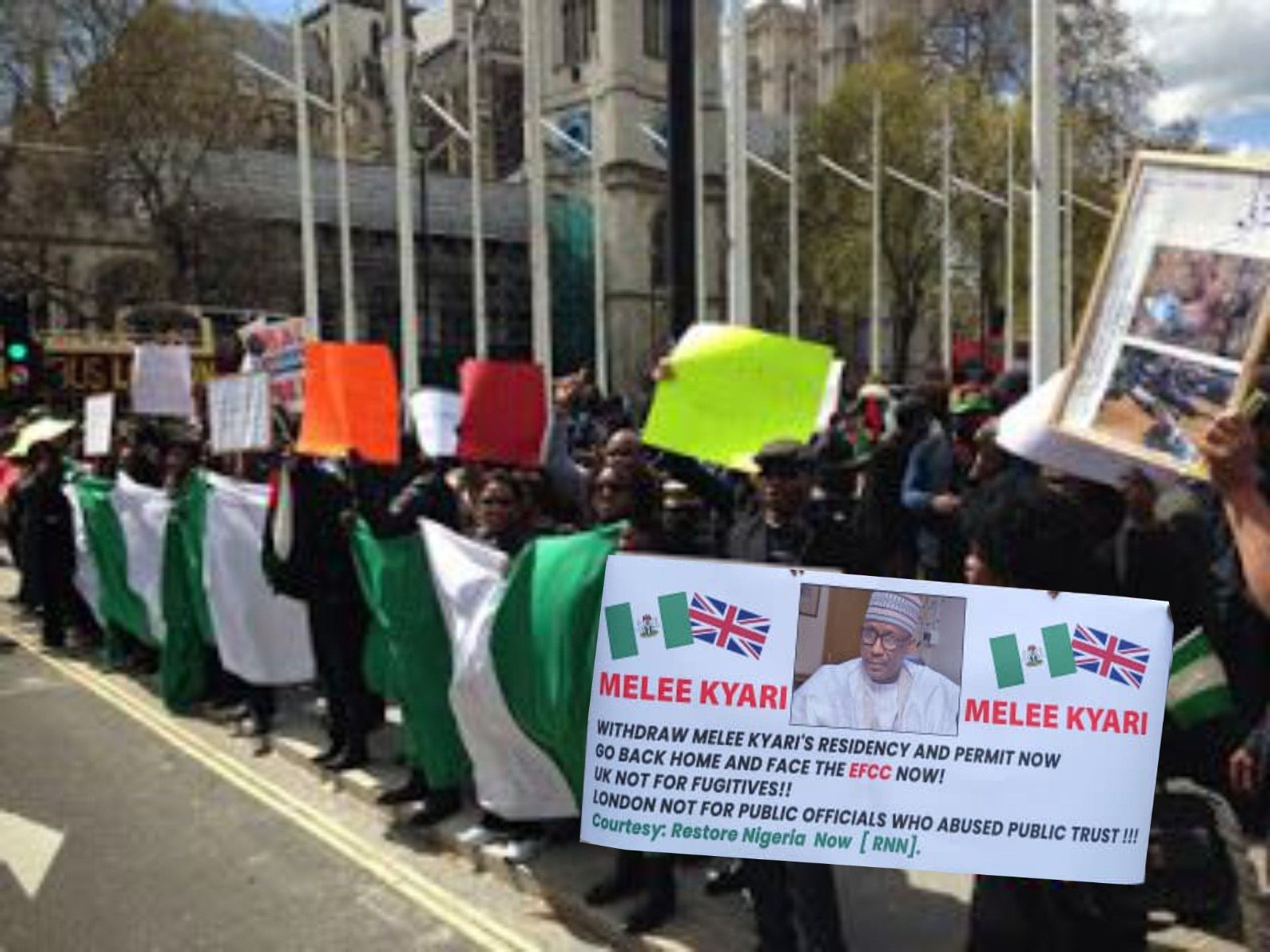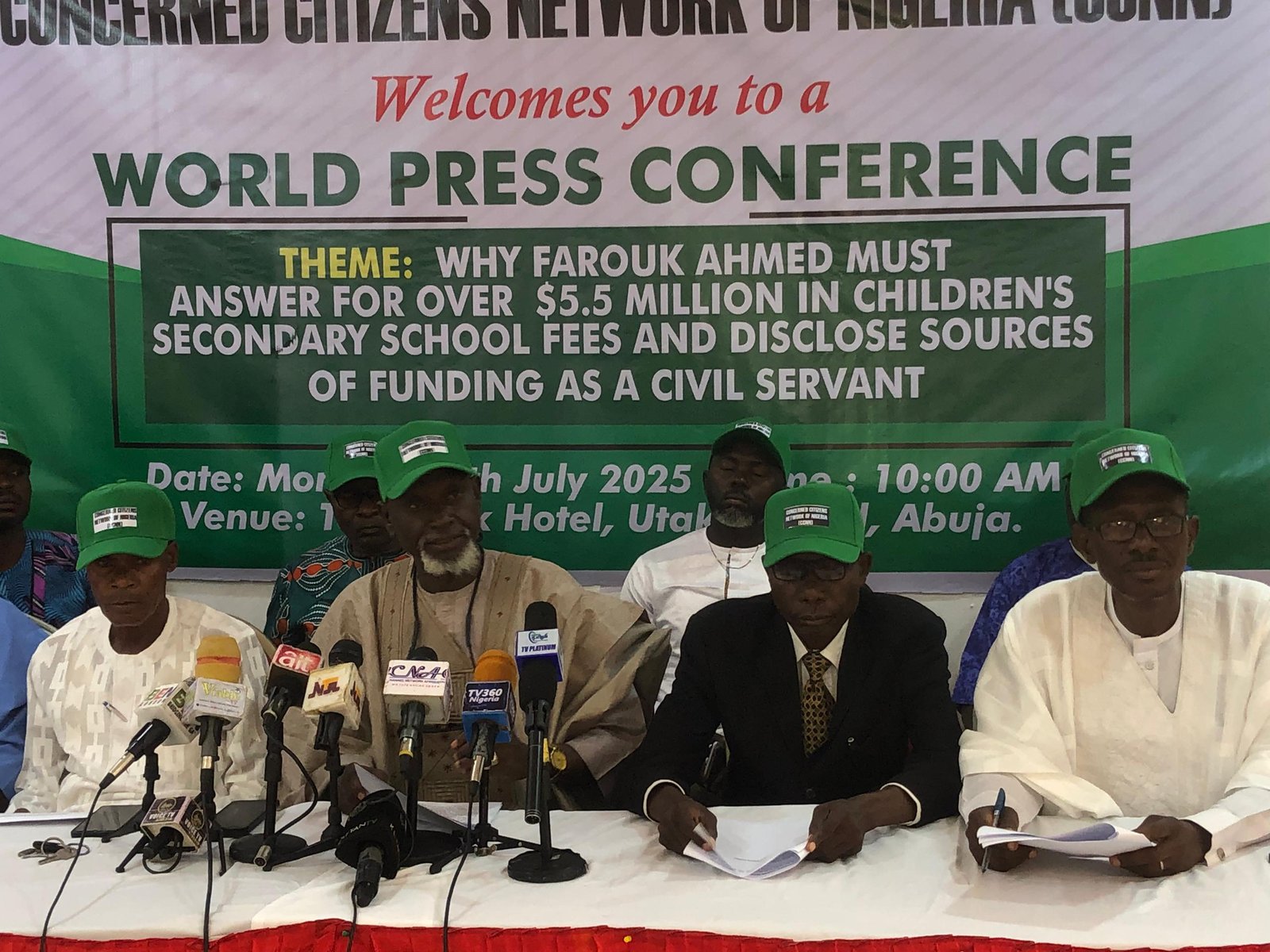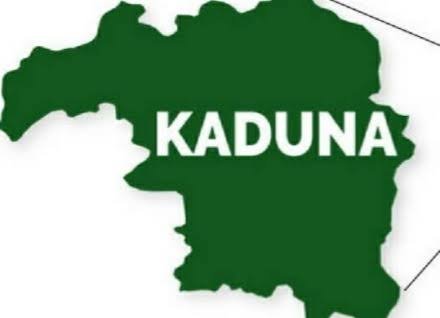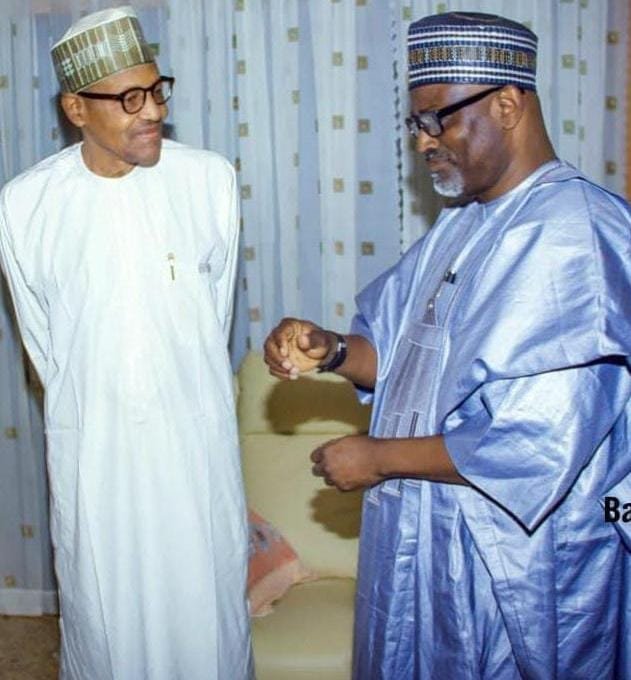Cover
BREAKING NEWS: ‘Kyari Must Go Home’ Protest Hits London as Nigerians Submit Letters to UK Home Office, High Commission

Hundreds of Nigerians stormed the Nigerian High Commission and the UK Home Office in London on Monday, May 12, 2025, demanding that former NNPCL boss Mele Kyari be deported to Nigeria to face corruption investigations.
The demonstrators, under the banner of Rescue Nigeria Now, gathered outside the Nigerian High Commission and the UK Home Office, submitting formal petitions to both institutions.
Protesters carried placards with bold inscriptions such as “Withdraw Mele Kyari’s residency now!”, “Mele Kyari go home and face EFCC now!”, and “London is not for public officials who abused public trust.”
They accused Kyari of fleeing Nigeria to evade accountability for alleged financial misconduct during his tenure at NNPCL from 2019 to 2025.
In a letter addressed to the Nigerian High Commissioner to the United Kingdom, the group said: “We are profoundly disillusioned and appalled by the effrontery with which Mr. Kyari has been walking in the street of London with impunity, while the tables of the Economic and Financial Crimes Commission (EFCC) and other anti-corruption agencies in Nigeria are flooded with so much petitions, audit queries, and evidences on the many alleged corrupt financial dealings and infraction that have been attached to his tenure which spanned from 2019 to 2025.”
“We see this as an affront to the people of Nigeria and an insult to the esteemed anti-corruption crusade of the Federal Republic of Nigeria, that an individual of such notoriety whose tenure in NNPCL was marred by unprecedented corruption and international embarrassment should not be allowed to roam freely on British soil without facing the consequences of his actions.
“Your Excellency, this letter is not merely a petition—it is a demand— A moral, civic, and nationalistic demand. We, therefore, demand in the strongest terms that the Nigerian High Commission in the United Kingdom refrains from according him any form of official reception, recognition, or diplomatic courtesy until he returns to Nigeria to submit himself to the Economic and Financial Crimes Commission (EFCC) and other relevant investigative bodies for the myriad allegations that trail his tenure.”
The petition detailed several allegations against Kyari, including the misappropriation of funds earmarked for refinery rehabilitation.
“It is on record till date that billions of dollars that were ostensibly budgeted for the rehabilitation of Nigeria’s decrepit refineries in Warri, Kaduna and Port Harcourt just unaccountably vanished into a bureaucratic abyss under the leadership of Mr. Kyari. While the nation was waiting expectantly for positive results, it was unfortunate that no tangible infrastructural improvement or reasonable output has been recorded as a justification to the gargantuan expenditures being made. Instead, Nigeria, a country known as the largest oil producer in Africa , continued importing refined petroleum products while its refineries remained moribund, mothballed, and perfunctorily maintained, further weakening the Nigeria naira,” the letter reads.
“At present, the forensic opacity that surrounded these rehabilitation contracts which have collectively impoverished the nation and eroded public trust in governance has been a point of convergence and sensitivity to several anti-corruption watchdogs and international observers who have described the NNPCL under Kyari as an Impenetrable black box. Moreover, it was alleged that Mele Kyari was running a syndicate of racketeers who were massively benefiting from the fuel importation operations at the detriment of the nation’s wealth.
“Under Kyari’s leadership, the controversial fuel subsidy regime mysteriously shrouded in confusion, crony capitalism, and unexplainable contradictions. opaque subsidy payments of over trillions of naira were disburses under the pretext of cushioning fuel costs. Yet, these payments lacked empirical substantiation and transparency on how it was spent. In demanding accountability, figures contradicted themselves, audits were ignored, and most damningly of this theatrics is that ordinary Nigerians were the ones that continued to suffer from the effects of fluctuating pump prices, artificial scarcity being created from his recklessness, and the nationwide persistent fuel queues that hit the country— a phenomenon that outrightly became emblematic of governance failure.
“Subsidy removal, though a visionary idea by President Bola Ahmed Tinubu, however became an ideological tool of deceit, not policy relief under Kyari’s watch. The EFCC has reportedly received whistleblower testimonies and documents alleging fraudulent invoicing, overblown subsidy claims, and clandestine offshore payments.”
Addressing the UK Home Office, Rescue Nigeria Now emphasized the international implications of harboring individuals accused of corruption.
The letters further alleged that Kyari transferred illicit funds to UK bank accounts.
“We are aware that Mr. Kyari is currently residing in the United Kingdom, a development he carefully orchestrated to evade facing justice in Nigeria for numerous acts of corruption and shady dealings that took place during his tenure,” the letter added.
“We have cause to believe that for Mr. Kyari to have fled to the United Kingdom, he has transferred parts of the proceeds of his crimes to bank accounts in London, which would be a violation of anti-money laundering legislation in your country.”
The coalition called upon the UK authorities to act in accordance with international anti-corruption agreements.
“The United Kingdom and Nigeria have established reciprocal treaties and agreements to curtail their citizens from willfully engaging in corruption and other criminal activities. This relationship is intended to ensure that justice is served and that fugitive criminals do not find safe havens in foreign countries.
“Considering the extensive evidence of corruption and the severe impact on Nigeria, we hereby request that the Home Office expel Mr. Mele Kyari so that he can return to Nigeria. It is imperative that he faces justice for his actions and that the stolen funds are recovered to aid in the nation’s recovery and development.”
The protest and petitions underscore the growing demand among Nigerians, both at home and abroad, for transparency and accountability in public service.
As the EFCC continues its investigations into the alleged misconduct during Kyari’s tenure, the international community’s response remains to be seen.
Cover
Group slams NMDPRA Boss Farouk’s Diversionary Newspapers Ads On $5.5 Million In Children’s Tuition Fees

*charges relevant agencies to open immediate investigation.
The Concerned Citizens Network of Nigeria (CCNN) has slammed Engineer Farouk Ahmed, Chief Executive of the Nigerian Midstream and Downstream Petroleum Regulatory Authority (NMDPRA), for his full-page newspaper advertisements published on July 11, 2025, as a “disgraceful charade” and “diversionary” designed to dodge accountability.
The group said the ads, appearing on page 12 of Thisday, page 17 of The Guardian, page 15 of Vanguard, page 3 of BusinessDay, and page 19 of Daily Trust, were unsigned and devoid of substance, failing to address explosive allegations that Ahmed spent over $5.5 million (approximately N8.25 billion) on his children’s secondary education abroad.
In a fiery press conference on Monday in Abuja, the CCNN, led by Dr. Emmanuel Agibi, demanded an immediate investigation, accusing Ahmed of insulting Nigerians’ intelligence with his evasive tactics.
The CCNN highlighted that Ahmed’s children—Faisal Farouk attended the Montreux school, Farouk Jr attended the Aiglon college, Ashraf Farouk attended the Institut Le Rosey while Farhana Farouk attended the La Garenne International School for six years each.
With annual tuition and upkeep exceeding $200,000 per school, the total cost for the four children is estimated at $5 million, or roughly $1.2 million per child over six years.
“The cost per child included annual tuition fees of approximately $130,000–$150,000 and an additional $50,000 for upkeep, flights, and other expenses. For each child, this amounts to roughly $180,000–$200,000 annually, or $1,080,000–$1,200,000 over six years,” the statement said.
“For four children, the total expenditure ranges from $4,320,000–$4,800,000. Even now, questions remain unanswered about the tertiary education of Ahmed’s children. Having completed their secondary education, Faisal, Farouk Jr., Ashraf, and Farhana are enrolled in prestigious universities abroad, where annual costs often exceed $70,000–$100,000 per student.
“Further compounding public outrage, Engr. Farouk Ahmed’s son recently graduated from Harvard University, where tuition and associated costs exceeded $152,000, with additional expenses in the range of $100,000. This extravagant expenditure, far beyond the gross earnings of a civil servant of his calibre, places an immense burden on Nigeria’s poor taxpayers, many of whom struggle to afford three meals a day or school uniforms for their children, particularly in the northern regions.
“Notably, Ahmed has never held employment outside his role with the Federal Government since leaving school, raising further questions about the source of his wealth. The opulence displayed in funding such elite education underscores a stark disconnect between Ahmed’s lifestyle and the economic realities faced by ordinary Nigerians.”
The group urged the Code of Conduct Bureau (CCB), Independent Corrupt Practices Commission (ICPC), and Economic and Financial Crimes Commission (EFCC) to investigate how a civil servant’s salary could fund such lavish expenditure.
“In a nation where over 10 million children, particularly in the north, lack access to basic education, this lavish spending by a public servant is not merely a matter of personal choice—it is a moral outrage,” the statement added.
“While countless Nigerian families struggle to afford primary schooling, Ahmed’s children attended secondary institutions costing more per term than the annual budgets of some federal colleges. This stark inequality represents an injustice that cannot be ignored.
“The absence of transparency regarding how these ongoing expenses are funded further fuels public suspicion. If Ahmed’s wealth can support such elite secondary and tertiary education, the public deserves to know the legitimate sources of these funds, especially given his role as a public servant accountable to Nigerian taxpayers.
“The CCNN’s allegations are grounded in rigorous evidence, stemming from a petition to the Attorney-General of the Federation after weeks of verification, fact-finding, and public record reviews.We question how a public official, whose salary is known and whose assets must be constitutionally declared, could finance such an extraordinary level of overseas education without a visible commercial empire or disclosed inheritance.
“The petition raises serious concerns about potential abuse of office, asset concealment, or diversion of public funds under Ahmed’s leadership at NMDPRA. Public response has been resolute, with peaceful protests by lawyers, students, and civic groups targeting the Attorney-General’s office, ICPC, EFCC, National Assembly, and NMDPRA headquarters. These demonstrations, supported by formal letters and placards, demanded a transparent investigation.
“The NMDPRA’s attempt to dismiss these voices as ‘faceless’ is a cynical effort to undermine lawful civic engagement, further eroding public trust. The NMDPRA’s statement conspicuously avoided addressing key issues: it did not deny the children’s attendance at the listed secondary schools, nor did it provide any breakdown of how tuition was funded.
“It offered no details on asset declarations, loans, business income, family inheritance, or blind trusts, relying instead on vague appeals to Ahmed’s ‘reputation’ and ‘integrity.’ In a democracy, such claims are insufficient when a public servant’s lifestyle appears misaligned with their declared income. The burden of proof rests with Ahmed, not the public.
“The CCB, ICPC, and EFCC have constitutional mandates to investigate cases of unexplained wealth, ensuring that public officials are held accountable. This case tests the credibility of President Bola Tinubu’s anti-corruption and transparency agenda. The CCNN is not calling for Ahmed’s immediate removal but for an open, independent investigation. If he is innocent, a transparent process will vindicate him.
“However, continued silence risks tarnishing both his reputation and the government’s reform efforts. Ignoring these allegations would be a grave miscalculation. The CCNN is submitting additional letters, pursuing legal action, and mobilising further protests to ensure accountability. Civic vigilance is not a nuisance—it is the cornerstone of a functioning democracy.
“Engr. Farouk Ahmed must step forward, disclose his funding sources, and submit to a full inquiry. This is not persecution—it is the price of public trust. The CCB, ICPC, and EFCC must act swiftly to investigate these allegations, ensuring that justice and transparency prevail.”
Cover
As KADA EduSummit Ends, Stakeholders Propose N440bn TVET Plan, Integration Of Almajiri System

Stakeholders at the Kaduna International Education Summit, EduPACT 2025, have proposed a bold N440 billion investment plan to transform Technical and Vocational Education and Training (TVET) in Kaduna State, while also advocating for the integration of the Almajiri education system into formal learning structures.
The three-day summit supported by the UK government through the FCDO PLANE program which concluded on Friday in Kaduna, recommended far-reaching reforms to align school curricula with industry demands, establish vocational hubs, and convert traditional learning centres into engines of economic empowerment.
Presenting the communique, Kaduna State Commissioner for Education, Professor Abubakar Sani Sambo, said participants stressed the need to allocate a minimum of 15% of the state’s education budget to TVET, describing it as a critical strategy for reducing youth unemployment and driving inclusive development.
The proposed N440 billion TVET roadmap is expected to hinge on public-private partnerships, the establishment of centres of excellence in key trade areas, and structured apprenticeship programmes aimed at equipping thousands of youths with practical, job-ready skills.
The summit also endorsed a comprehensive reform of the Almajiri system, calling for the inclusion of Almajiri children in vocational training programmes, removal of barriers such as mandatory school uniforms and PTA levies, and the engagement of religious leaders as key advocates for the transformation.
“Almajiri children must no longer be left on the fringes. We have resolved to modernize this system by bridging Qur’anic education with literacy, numeracy, digital skills and vocational training,” the communique stated.
Participants drawn from government agencies, local and international development partners, academia, traditional and community leaders, civil society groups and student bodies, deliberated on what they termed a ‘whole of society approach’ to rebuild Kaduna’s education sector.
The Summit also endorsed the establishment of a Kaduna State Education Reform Council to harmonize the roles of the State Universal Basic Education Board (SUBEB), Teachers’ Service Board (TSB), Ministry of Education and other actors, as well as review outdated education policies.
To tackle overcrowded classrooms, especially in rural communities, the gathering called for accelerated teacher recruitment and periodic skills gap assessments to align competencies with modern pedagogical needs.
Digital learning featured prominently in the resolutions, with commitments to expand smart classrooms, integrate artificial intelligence into teaching and research, and explore alternative energy sources such as solar, wind and biofuels to power rural schools.
Under the proposed digital drive, the summit recommended launching a Kaduna Research Cloud to support higher institutions and ramp up global competitiveness.
The communique equally pushed for strengthening School-Based Management Committees (SBMCs), Parent-Teacher Associations and Mothers’ Associations to deepen community ownership and school accountability, while scaling grassroots campaigns to boost enrolment and retention.
Youth inclusion was highlighted as a critical plank of the transformation blueprint, with calls for integrating student voices into school boards and policy planning, alongside enforcing equitable tuition regimes and creating disability-friendly campuses.
Participants further resolved to prioritize the needs of Persons With Disabilities (PWDs) and out-of-school children, expand early childhood education centres in underserved areas, and shift from fragmented Local Government-level interventions to a statewide approach for consistency and bigger impact.
The Communique however stressed that EduPACT 2025 was not just another policy talk-shop, but a movement to turn dialogue into measurable action. “We reaffirm our commitment to treat education not as a political agenda but as a sacred promise to every child in Kaduna State,” it declared.
Cover
Ambassador Coomassie Mourns Former President Muhammadu Buhari

The Global Vice Chairman (Africa) of the International Commission for Peace and Good Governance and Head of Mission–Nigeria for the International Peace Commission, Ambassador Hussaini Coomassie, has expressed profound grief over the passing of former President Muhammadu Buhari, describing him as a true patriot and a devout leader.
In a heartfelt tribute, Ambassador Coomassie remarked: “He came, he saw, and he conquered. President Buhari’s passing is not only a monumental loss to Nigeria but to the global community. This news is deeply saddening and shocking. Yet, I find comfort in the knowledge that he lived a purposeful and impactful life, departing at the age of 82, what I call the injury time of life. Life remains a journey full of uncertainties.”
On behalf of the International Peace Commission, Ambassador Coomassie extended his sincere condolences to President Bola Ahmed Tinubu, Governor Dikko Umar Radda, Mrs. Aisha Buhari, and the entire Buhari family in this time of mourning.
“May Allah grant him eternal rest. Aameen,” he concluded.
-

 Fashion8 years ago
Fashion8 years agoThese ’90s fashion trends are making a comeback in 2017
-

 Entertainment8 years ago
Entertainment8 years agoThe final 6 ‘Game of Thrones’ episodes might feel like a full season
-

 Fashion8 years ago
Fashion8 years agoAccording to Dior Couture, this taboo fashion accessory is back
-

 Sports8 years ago
Sports8 years agoPhillies’ Aaron Altherr makes mind-boggling barehanded play
-

 Entertainment8 years ago
Entertainment8 years agoMod turns ‘Counter-Strike’ into a ‘Tekken’ clone with fighting chickens
-

 Entertainment8 years ago
Entertainment8 years agoThe old and New Edition cast comes together to perform
-

 Business8 years ago
Business8 years agoUber and Lyft are finally available in all of New York State
-

 Entertainment8 years ago
Entertainment8 years agoDisney’s live-action Aladdin finally finds its stars




